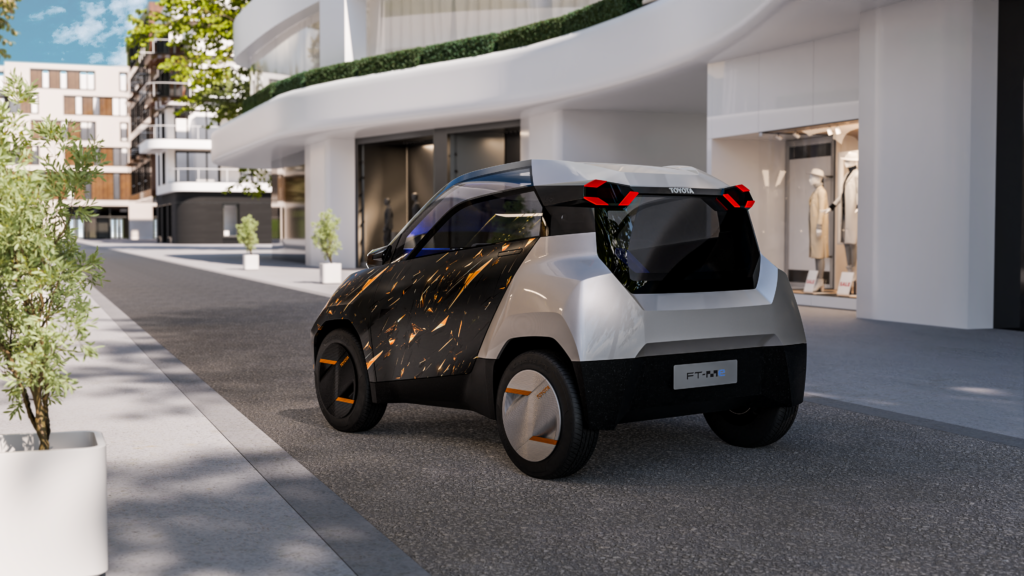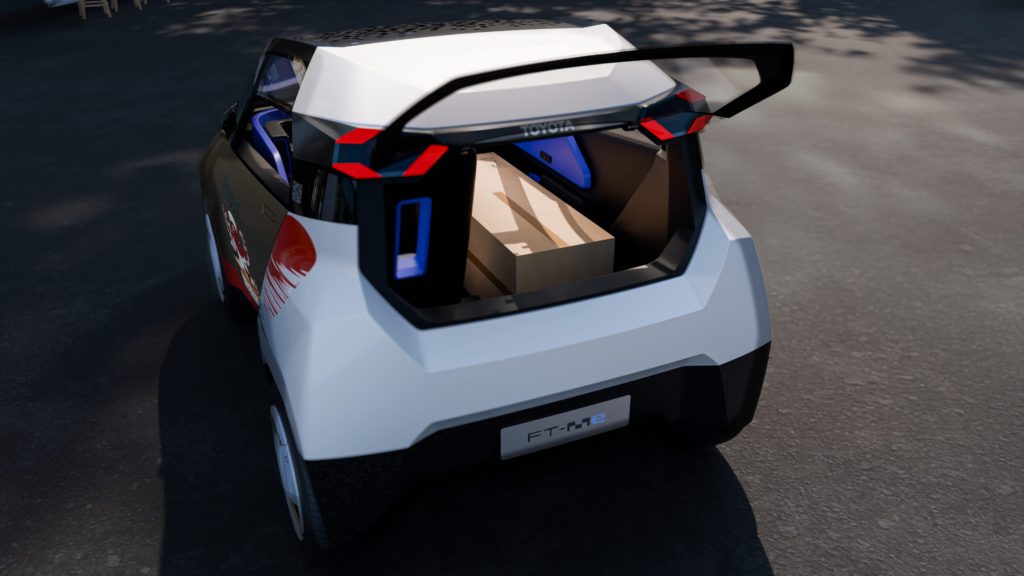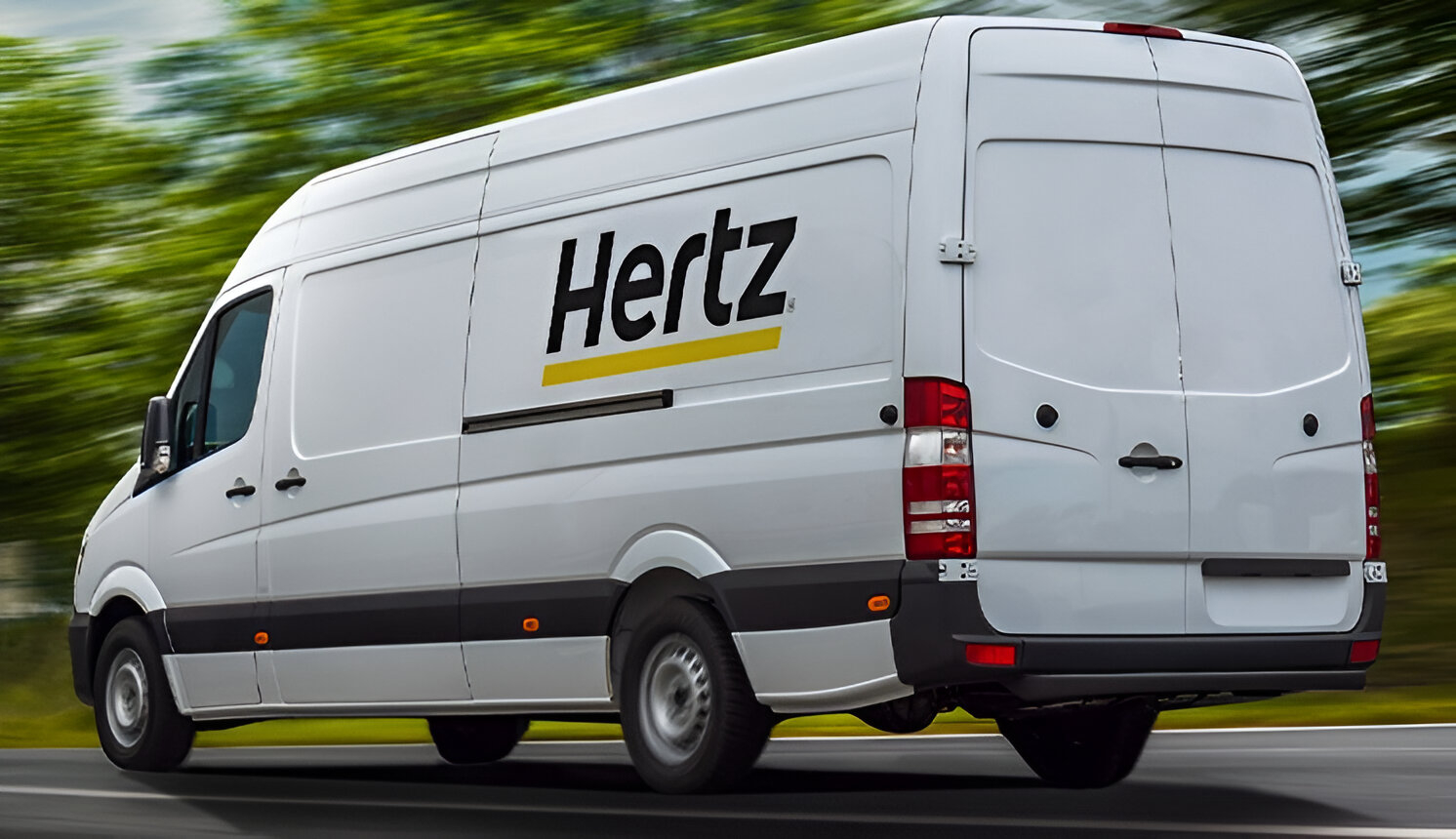Toyota unveils its latest concept car, the FT-Me, a tiny electric vehicle designed specifically for dense urban environments. While Toyota may have been slower to join the EV revolution, this innovative concept demonstrates the company’s vision for the future of compact personal transportation. The Toyota FT-Me combines ultra-compact dimensions with surprising practicality, advanced visibility features, and sustainable design elements that could make it ideal for city dwellers.
Ultra-Compact Urban Dimensions

The FT-Me embraces extreme compactness as its defining characteristic. Measuring just over 8 feet in length, this miniature electric vehicle is specifically designed to navigate and park where conventional cars simply won’t fit. That’s something even the greatest Toyota models can’t do. Its diminutive footprint allows it to slip through narrow streets and find parking in spots that would be impossible for standard vehicles.
This radical downsizing represents Toyota’s response to the reality of increasingly dense urban environments, where space is at a premium and traditional cars can be more burden than benefit. The FT-Me’s compact dimensions aren’t just about convenience—they represent a fundamental rethinking of how much vehicle is actually necessary for urban mobility. By dramatically reducing the vehicle’s physical presence, Toyota addresses one of the most pressing challenges of city living: finding enough space for everyone and everything.
Surprisingly Practical Interior

Despite its tiny exterior dimensions, the FT-Me offers surprising practicality inside. The vehicle accommodates two passengers in its standard configuration—driver and one passenger—making it suitable for the vast majority of urban trips that typically involve just one or two people.
The real innovation comes in the flexible interior design. The passenger seat can fold down completely when not needed, creating valuable cargo space for larger items. This thoughtful feature transforms the tiny car from a people carrier to a utility vehicle in seconds, allowing owners to adapt the space to their changing needs. Whether you’re commuting with a friend or picking up groceries, the FT-Me’s convertible interior ensures you don’t need different vehicles for different tasks.
This balance of minimal exterior size with maximum interior utility demonstrates Toyota’s understanding that even micro vehicles must offer practical functionality to serve as viable transportation options in the real world.
Futuristic Design Language

The FT-Me makes a bold visual statement with its futuristic, angular design and distinctive black-and-chrome color scheme. Rather than simply creating a shrunken conventional car, Toyota has embraced a forward-looking aesthetic that signals the vehicle’s innovative nature.
Sharp edges, geometric shapes, and a distinctive silhouette give the FT-Me a presence that belies its tiny footprint. The design language communicates that this isn’t just a small car—it’s a different approach to mobility altogether. While the article notes that this futuristic styling might be “a little ahead of its time,” it represents Toyota’s vision for where urban mobility is heading.
This distinctive appearance serves both practical and brand purposes. It helps the small vehicle remain visible in traffic among larger cars while establishing a unique identity that could appeal to early adopters and tech-forward urbanites who want their vehicle to make a statement about their values and lifestyle.
360-Degree Visibility System

Safety is paramount in urban environments where pedestrians, cyclists, and vehicles constantly interact in close proximity. The FT-Me addresses this with a specialized visibility system that gives the driver a complete 360-degree view of their surroundings.
This enhanced visibility is particularly important given the vehicle’s small stature amid larger traffic. The design incorporates extensive glass areas and potentially cameras or sensors that eliminate blind spots, helping drivers maintain awareness of everything happening around them—from pedestrians stepping off curbs to cyclists approaching from behind.
Toyota specifically highlights this feature as beneficial for new drivers who might be using the FT-Me as their entry-level vehicle. The comprehensive visibility system could reduce the anxiety many new drivers feel about spatial awareness and help prevent accidents in congested urban settings, making the FT-Me not just a practical choice but potentially a safer one as well.
Energy Efficiency and Sustainability

Sustainability lies at the core of the FT-Me’s design philosophy. According to Toyota, this micro EV consumes three times less energy per kilometer than a high-capacity electric vehicle—a dramatic efficiency improvement that reduces resource requirements and environmental impact throughout the vehicle’s lifecycle.
This efficiency comes from several factors: the reduced weight of the smaller vehicle, optimized aerodynamics, and advanced electric drivetrain technology. The result is a vehicle that can deliver urban mobility with minimal energy consumption.
Perhaps most innovative is the FT-Me’s solar panel roof, which can contribute 20-30 kilometers (12-19 miles) of electric range per day through solar charging alone. For many urban dwellers who drive limited daily distances, this solar capability could significantly reduce the need for plugging in, potentially allowing some users to operate almost entirely on solar power during sunny seasons. This feature addresses the charging infrastructure challenges that remain a barrier to EV adoption in many urban areas.
Targeted Entry-Level Market

Toyota has positioned the FT-Me as a potential entry-level option specifically targeted at new drivers. This strategic focus acknowledges changing attitudes toward car ownership, particularly among younger urbanites who may not need or want a conventional vehicle.
The FT-Me could serve as an accessible first step into personal mobility—less intimidating to drive and park than larger vehicles, more affordable due to its smaller battery and simplified components, and better aligned with the values of environmentally conscious young consumers.
By creating a vehicle explicitly designed as an entry point, Toyota is potentially cultivating a new generation of customers who prioritize different attributes in their transportation options. The FT-Me represents an opportunity to establish brand loyalty with consumers who might otherwise skip car ownership entirely in favor of public transit or shared mobility services.
Concept Status and Future Possibilities

The FT-Me remains a concept vehicle with no confirmed production plans. However, its development signals Toyota’s continued exploration of diverse mobility solutions beyond its conventional vehicle lineup.
Concept cars like the FT-Me serve multiple purposes: they test public and market reaction to new ideas, showcase technological capabilities, and signal brand directions to investors and competitors. While the specific design might evolve substantially before reaching production (if it ever does), the core concepts of ultra-compact dimensions, flexible interior space, enhanced visibility, and solar integration represent Toyota’s thinking about future urban mobility challenges.
The FT-Me concept aligns with global trends toward smaller, more efficient vehicles for congested cities, particularly in Europe and Asia where micro-mobility solutions are gaining traction. Whether this exact vehicle reaches production or its ideas influence other models, the FT-Me demonstrates Toyota’s recognition that the future of urban transportation may look very different from its past.




























